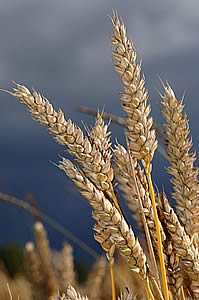| 27/02/08
Increasing grain prices and a shortage of corn due to a
surge in bioethanol production are significantly impacting
on the South Korean feed industry.
According to agriculture to aquaculture specialists Kiotechagil,
which manufactures a range of products for the animal feed,
grain and aquaculture industries, corn supplies are dwindling
and some mills are expecting to run out of wheat in the
next few months.
Murray Hyden, chief technical officer at Kiotechagil explained, “South
Korea has a strong and growing animal feed industry but
this situation has lead to a change in the feed formulations
used in Korea. Feed mills are now buying any starch materials
that they can, and imports of manioc starch are increasing
to make up the deficit.”
South Korea is one of the most important grain-importing
nations. In a typical year, the country buys more than
12.5 million tonnes of maize, wheat and other grains. Average
annual maize imports of 8.5 million tonnes for feed and
industrial use place South Korea in a close race with Mexico
for second place worldwide.
“Manioc starch lost popularity in Europe due to slow
gelatinisation through pelleting operations,” explained
Kiotechagil’s Murray Hyden. “Conditioning
times in Korea are very short at 10 – 15 seconds
rather than the 60 seconds normally used in the UK. Short
conditioning times do not pregelatinise the manioc and
as a result pellet quality is falling.”
Murray Hyden suggests the use of a low inclusion binder
like Kiotechagil’s MASTERCUBE which will compensate
for the slow gelatinisation of manioc starches. It will
also reduce the need for double conditioning and double
pelleting and can therefore replace expensive and increasing
energy costs with an easy to use formulation change.
South Korea has a population of about 48 million with a
landmass of 100,000 square kilometres, yet only 20% of
this is arable. The country depends on imports for 60-70%
its food and feed needs. This has increased from about
50% in 1990 and 40% in 1980.
The feed industry in the country is growing with consumption
of corn for livestock feed averaging 6.7 million tonnes
over the past 5 years, an increase from under 2 million
tonnes in the late 1970s.
Likewise, the production of layer and broiler chickens
is expected to increase due to strong demand for poultry
products. South Korea currently uses imported chicken meat
at restaurants and fast food chains but with the demand
for poultry products on the rise, this will lead to a production
increase in domestic production of both layer and broiler
chickens, which will require efficiency improvements in
feedmill operations especially with regards to energy usage.
Low inclusion binders like Kiotechagil MASTERCUBE can economically
maintain pellet quality when using lower grade starches
without increasing energy costs.
 Energy-Rich Diets Maximise Ewe and Lamb Potential Energy-Rich Diets Maximise Ewe and Lamb Potential
 Senior Management Changes at Kiotechagil Senior Management Changes at Kiotechagil
 New Lamb Feeder from Trouw Nutrition New Lamb Feeder from Trouw Nutrition |


